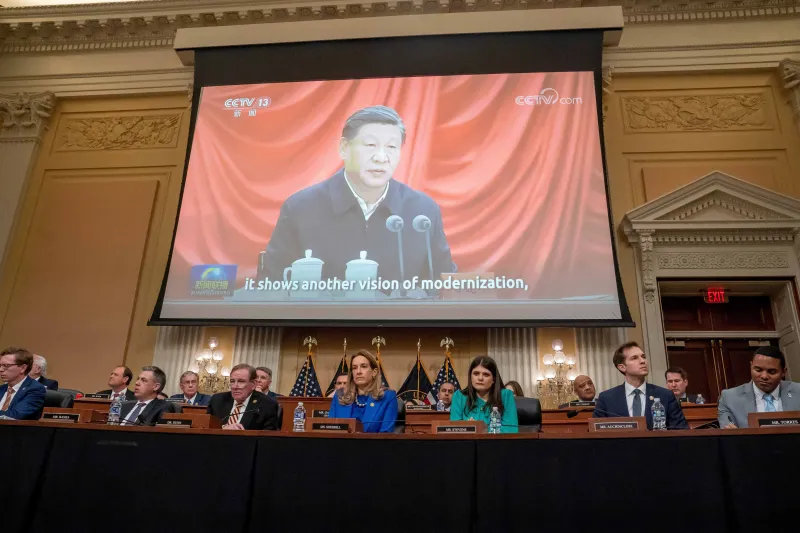
Dr. Sanjay Gupta: What Science Says About Cannabis
CBD and THC are being used more than ever for arthritis and joint pain. But does microdosing cannabis really help with inflammation, and what should…
Thought Leader: Sanjay Gupta

There is a growing bipartisan awareness in the United States that the totalitarian global ambitions of the Chinese Communist Party (CCP) make it the most dangerous threat the free world has faced since the Cold War, and perhaps ever. In recognition of that threat, U.S. President Donald Trump’s National Security Council announced a comprehensive China strategy in May 2020 and later declassified its Indo-Pacific strategy. These documents were built around three key objectives: protecting the U.S. homeland, preserving the peace through a policy of strength, and advancing American prosperity by reshoring the key pillars of the U.S. economy.
To his credit, U.S. President Joe Biden has implemented the broad outline of his predecessor’s strategy and has scored some notable successes in confronting an increasingly aggressive China. Among them are the AUKUS defense agreement with Australia and the United Kingdom, a ban on advanced semiconductor exports to China, the blacklisting of the chip maker YMTC and 21 other major Chinese players in the artificial intelligence chip sector, and a series of bilateral agreements with Pacific allies to improve mutual defense.
Now, Congress can build on these steps by passing measures that will advance the China strategy outlined by Trump and largely embraced by Biden, protecting the U.S. homeland from Chinese threats and strengthening Washington’s military and economic position vis-à-vis Beijing. The House Select Committee on the Chinese Communist Party—led by its chairman, Mike Gallagher, Republican of Wisconsin, and ranking member, Raja Krishnamoorthi, Democrat of Illinois—will be the focal point of this effort. But Congress as a whole should use this opportunity to advance an agenda for protecting the American way of life from China’s undue influence, preserving the United States’ stature as the free world’s indispensable superpower, and advancing the U.S. national interest.
The first and most urgent step is to ban TikTok, WeChat, and every other Chinese app from American phones. Disguised as social media, TikTok could in fact be used to surveil millions of Americans and compromise the phones of U.S. military personnel, FBI Director Christopher Wray told the Senate Intelligence Committee in March 2023. Indeed, TikTok’s reach—potentially spying on 100 million Americans—makes the Chinese spy balloon’s transit over the continental United States early this year look like child’s play. TikTok executives deny that their parent company, ByteDance, is controlled by the Chinese government and that the CCP uses the app to aid its intelligence efforts. Such claims are difficult to credit, however; a former head of a unit within TikTok’s safety operations told The Washington Post that senior managers at the company were “lying” to U.S. government officials about data privacy and said that “a truly leakproof arrangement for Americans’ data would require a ‘complete re-engineering’ of how TikTok is run.” (ByteDance said these allegations were “unfounded.”)
The House of Representatives has advanced a bill to ban TikTok, and Senator Josh Hawley, Republican of Missouri, has introduced similar legislation in the Senate. But Congress should not neglect other malign Chinese social media apps, including WeChat, which is popular with Chinese living abroad and which the CCP uses to target dissidents in this diaspora, according to a study by Monmouth University. (WeChat denies storing users’ chat logs or surveilling their communications.)
Once it has addressed the pressing dangers posed by Chinese surveillance apps, Congress should turn its attention to China’s role in the COVID-19 pandemic. U.S. lawmakers should expand their investigation of the origins of COVID-19 in China, including any possible role of U.S. research grants in developing the virus that causes the disease. The House Oversight Committee, which is currently conducting this investigation, should seek to expose both the source of the virus and the Chinese government’s subsequent cover-up, which contributed to the disease’s silent spread to the United States and around the world between October 2019 and January 2020.
The first and most urgent step is to ban TikTok.
Next up should be a ban on the sale of U.S. farmland to Chinese companies. The United States has 900 million acres of farmland that produce more than $177 billion in exports. Alarmingly, in terms of the dollar value of land, Chinese ownership of U.S. farmland leapt more than 20-fold between 2010 and 2020, from $81 million to $1.8 billion. Beijing’s large-scale backing of these investments shows that they are part of a broader strategy that threatens to give China control over a significant amount of the U.S. food supply as well as footholds near American military bases from which the CCP could conceivably conduct surveillance.
The Promoting Agriculture Safeguards and Security Act, sponsored by the Republican Representatives Elise Stefanik of New York and Rick Crawford of Arkansas, would if enacted bar China, Iran, North Korea, and Russia from purchasing U.S. agriculture companies or land. It would also increase oversight of other foreign acquisitions and require the U.S. secretary of agriculture to publicly disclose all foreign agribusiness purchases. This bill or similar legislation banning Chinese ownership of U.S. farmland should be passed with haste.
Another vulnerability that must be addressed concerns telecommunications. Congress should enact laws requiring all telecom companies to dismantle cell towers that include Chinese-made components, beginning with those near sensitive military installations. According to CNN, a recent FBI investigation found that equipment from the Chinese telecommunications company Huawei—which is already banned from all U.S. government devices—is capable of disrupting Department of Defense communications, including those of the agency that oversees the U.S. nuclear weapons stockpile. Congress should ban the installation of all Chinese equipment in U.S. telecommunications systems and appropriate funding to reimburse carriers for the cost of moving to trustworthy vendors.
Congress must take action against Confucius Institutes.
Congress should also highlight the dangers posed by companies connected to the Chinese Academy of Sciences, a powerful scientific research institution that works extensively with the Chinese military and intelligence services. All companies connected to the CAS should be added to the U.S. Commerce Department’s so-called Entity List, prohibiting them from access to strategic American technologies.
The most ubiquitous CAS-affiliated company is Lenovo, the world’s market leader in personal computer sales. Lenovo was founded in 1984 by a group of CAS engineers and now controls roughly 15 percent of the market in the United States, potentially endangering the sensitive personal and enterprise data of millions of Americans and businesses. Adding Lenovo to the Entity List would send a strong signal that Washington is no longer going to allow Beijing to spy on Americans under the guise of commercial enterprise.
Finally, Congress must take action against Confucius Institutes. Since 2004, the Chinese government has sponsored such institutes on college campuses around the world, providing teachers, textbooks, and operating funds. A 2017 report by the nonprofit National Association of Scholars found that Confucius Institutes undermine academic integrity and import censorship directly into the U.S. education system. Any American college or university that hosts such institutions should be banned from receiving federal funding, including student loans and Pell grants.
It is not enough to guard against Chinese threats on the home front, however. The United States must pursue peace through strength to deter Chinese adventurism in the Indo-Pacific and beyond. Although much would be required to implement such a policy, two crucial needs stand out: deploying hypersonic missiles and rebuilding the U.S. Navy. The Trump administration made the development and deployment of hypersonic missiles the United States’ top defense priority. At the time, China had taken the lead in developing hypersonic platforms. But since then, the U.S. Air Force’s Air-Launched Rapid Response Weapon and the U.S. Army and Navy’s Conventional Prompt Strike—both advanced hypersonic missiles—have achieved significant progress in their test programs.
The United States must maintain its momentum in this critical area while also seeking new paths for innovation in hypersonic weapons. In addition, Washington must fund efforts to devise effective countermeasures to the development of Chinese hypersonic missiles. In all of these areas, Congress can encourage the Department of Defense to cooperate with allied countries such as Japan and the United Kingdom. Although research and development are important, deploying sufficient quantities of hypersonic missiles across the armed forces must be the United States’ main objective. Swiftly achieving this goal is vital to restoring deterrence in the Indo-Pacific.
At the same time, Washington must strengthen the navy. Naval supremacy is critical to U.S. power. Having an advantage on the high seas deters foes such as China, which is determined to become the world’s leading naval and land power. After decades of a declining U.S. fleet size (and given the fragility of the American shipbuilding industrial base), it will take years to reach the force level required to sufficiently deter China. Even the highly accelerated shipbuilding plan the Trump administration submitted to Congress in December 2020 would have taken until 2031 to reach 355 battle force vessels, the number that many experts agree is the minimum for the navy to maintain its global role. Congress should look to the Trump administration’s 2020 plan, which sought to extend the life of existing ships and platforms, as a blueprint for increasing the size of the U.S. fleet.
The United States must pursue peace through strength.
To that end, Congress should immediately direct the navy to extend the life of more than half a dozen viable Los Angeles-class submarines (and provide the funds for it to do so). Such an effort will help the navy avoid a submarine shortage. Addressing the maintenance backlog on Virginia-class submarines should be another top priority. The fact that so many of these subs have been awaiting maintenance for years is a national disgrace and hinders the United States’ ability to defend Taiwan and other partners in the Indo-Pacific.
Congress should also invest in numerous vertical missile launching systems for its surface vessels to deter and, if necessary, fight China. For less than $1 billion per ship, the United States can extend the lives of Ticonderoga-class cruisers. Retiring this class of ships without replacing their vertical launching systems would hand the CCP a naval victory of enormous significance without a shot being fired. The navy’s leadership seems intent on doing just that, so Congress has no choice but to forcefully intervene.
Lastly, Congress should push the navy to establish a Rapid Capabilities Office to streamline bureaucratic acquisition processes. Naval procurement is characterized by an inability to harness commercial innovation and an unwillingness to tolerate the necessary risk to field new technology quickly. Such an office could deliver meaningful new capabilities for unmanned aerial and underwater vehicles within two or three years, for example.
Just as important as bolstering U.S. naval power is preserving the economic might that underpins it. Last year, the Biden administration proposed and Congress passed the CHIPS and Science Act, giving the U.S. semiconductor industry a $50 billion boost. Federal incentives will help bring this critical manufacturing capability back to the United States. But the United States must continue to reshore, near-shore, and friend-shore production and manufacturing not just of semiconductors but also of pharmaceuticals, rare earth elements, and batteries, which are critical to the electric and autonomus vehicle industries. Congress should look to pass legislation similar to the CHIPS Act for these and other vital sectors.
Lawmakers must also take care not to alienate major technology companies. The Pentagon and the intelligence community rely on the resources and expertise of leading American developers to maintain the United States’ advantage in key areas such as artificial intelligence, machine learning, cyber, robotics, and autonomous systems. Through its “China 2025” project, Beijing seeks to dominate each of these sectors within the next few years.
Congress must therefore stop targeting U.S. technology companies in the specious name of “competition.” Instead, it needs to find ways to incentivize those firms in their innovation race with Chinese competitors. The Open App Markets Act, an antitrust bill proposed by Senator Amy Klobuchar, Democrat of Minnesota, is not the way to do this: it would leave Americans’ phones open to Chinese hacking and malware and hurt U.S. companies without addressing the real danger from TikTok and other Chinese behemoths.
Lawmakers must not alienate major technology companies.
Legitimate issues such as foreign influence, political bias in online content moderation, and misinformation on social media should be addressed with narrow legislation. But those concerns should not be used as an excuse to hamper the best technology innovators when the United States needs them on its side, not on the sidelines.
Congress must also act to stop the massive flows of U.S. capital into Chinese markets. Foreign direct investment by American companies into China more than doubled between 2008 and 2021, from over $50 billion to just under $125 billion. BlackRock, the world’s largest asset manager, and other firms invest billions of dollars from U.S. retirement accounts in companies that are keeping the Chinese economy afloat.
Congress must discourage public and private investment in the CCP’s totalitarian state—for instance, by pressing the U.S. Treasury Department to deny tax credits for investments in China. In 2020, Congress passed the Holding Foreign Companies Accountable Act, which requires foreign companies listed on stock exchanges in the United States to comply with stronger regulatory and audit practices. But Congress should insist that the Public Company Accounting Oversight Board, which audits publicly traded companies in the United States, scrutinize U.S.-listed Chinese companies and delist them after three years if they fail to comply with the same audits as American corporations.
As China’s brazen invasion of American airspace with its spy balloon and Chinese President Xi Jinping’s defiance of U.S.-led sanctions against Russia have demonstrated, China has lost respect for the United States. The fact that so many American companies and financial institutions are still willing to do business as usual with China is also taken by Beijing as a sign of American weakness.
Congress can play a crucial role in changing this perception by investigating and exposing Chinese wrongdoing and legislating to stop it. In a time of significant political polarization in the United States, it is heartening that a bipartisan consensus has formed around the need to secure the country and protect the American way of life from the CCP.
Dr. Sanjay Gupta: What Science Says About Cannabis
CBD and THC are being used more than ever for arthritis and joint pain. But does microdosing cannabis really help with inflammation, and what should…
Thought Leader: Sanjay Gupta
Niall Ferguson: What’s Trump’s plan with Iran, and beyond?
Is there a deeper strategy underlying President Trump’s actions? Dan is joined by historian, Free Press columnist, CBS contributor, and Senior Fellow at Hoover Institution…
Thought Leader: Niall Ferguson
Niall Ferguson: Trump, the Midterms, and the Six-Year Itch
Nearly every two-term president, from Truman to Obama, hits a wall in year six. Can Donald Trump avoid domestic-political disaster? In this Free Press essay,…
Thought Leader: Niall Ferguson

